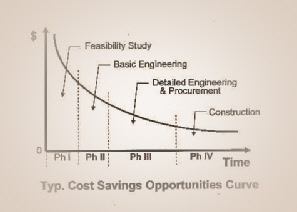
John Buecheler & Associates, Engineering & Construction Project Management




Golden Rule
for
the Execution of Capital Projects
Project Management Foundations

Management is the driving and controlling force which uses the financial, technical and human resources effectively in order to bring a capital project to fruition. As such, it also identifies and mitigates the risks. It is in fact:

- A proven scientific process beyond gut
feeling and intuitive decision-making.
- A methodology immune from surfing the fads.
- A function of current business conditions.
- Dependent on project characteristics, corporate organizations and available resources, agendas of internal and external power groups, as well as other variables.
- Evolving in the rapidly changing environment.
And naturally, the best management practices are likely to lead to optimum results.

Management State-of-the-Art

Recognizing the value of Professional Management, we made a survey of leading world-class firms with advanced project management methodologies and identified the state-of-the-art as we entered the 21st Century.
Role and Qualifications of the Project Manager


The project manager or project director is the “General Manager” of the Project. As such, he must have a good understanding of the engineering, commercial and managerial disciplines and a thorough grasp of the codes and regulations in effect. He also must be able to draw adequate and timely project resources. Further on, to bring his project to fruition, he must be able with his organization to adjust to rapid changes.
In addition, while the financial outcome of a project is of paramount importance, let’s keep in mind that quality and safety are key elements to the ultimate success of a project.
First Things First

By the very nature of things, the decisions  made during the initial phases of the
projects have also the biggest cost-impacts. This starts at the conceptual stage.
It is therefore no wonder that it is precisely at that point that the management
expert is to be called upon for his contribution. Thus, as a first step:
made during the initial phases of the
projects have also the biggest cost-impacts. This starts at the conceptual stage.
It is therefore no wonder that it is precisely at that point that the management
expert is to be called upon for his contribution. Thus, as a first step:
“Early involvement of project management expertise offers the greatest opportunities for cost savings”.

Management Timeline

Early involvement of the project consultant makes it also possible to prepare an optimum “road map” for running the project, while changing directions later-on is usually costly and often impractical.
Of course, once an appropriate execution plan is in place, bringing the project to fruition rests on the manager’s leadership and on his adherence to current best practices in the industry.
As the project progresses through detailed engineering, procurement and construction, a well planned and organized project permits to “manage by exception”. What this means is that the manager is in the best position to monitor and keep control of the project by early identification of deviations from the plans and to take appropriate action to get back on target.

Changes to Scope

Change may occur for a variety of causes. They are generally unpredictable and only one thing is sure: During the life-cycle of a project, changes do occur. And since they tend to disrupt the original plans they have to be addressed accordingly.
more

Claims

When for whatever reason change orders cannot be brought to a resolution, claims might become inevitable. They are a last recourse.
more
JBinFlorida@hotmail.com
Top
more






